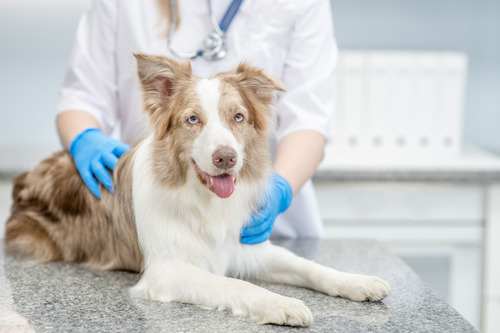Noticing changes in your dog’s breathing can be unsettling. If your dog’s breathing patterns suddenly shift—perhaps they’re breathing more rapidly, more shallowly, or making unusual noises—it’s natural to feel concerned. This guide can help you understand some common reasons behind unusual canine breathing patterns and when it might be time to consult your veterinarian at Berthoud Animal Hospital.
Recognizing Abnormal Breathing
Understanding what abnormal breathing in dogs looks like is the first step toward recognizing potential health issues. Normal breathing for dogs typically ranges from 15 to 30 breaths per minute, depending on their size and breed. However, variations can occur based on activity level and temperature.
What Does Abnormal Breathing Look Like?
Abnormal dog breathing can manifest in several ways:
- Increased Respiratory Rate: Breathing faster than usual which may indicate excitement, stress, or more serious conditions like heatstroke or respiratory distress.
- Noisy Breathing: Snoring, wheezing, or raspy breaths could suggest blockages, allergic reactions, or throat issues.
- Labored Breathing: Appearing to struggle for breath, using extra muscles visibly to breathe, can signal serious conditions requiring immediate veterinary care.
Recognizing these signs early can be crucial for the health of your pet.
Common Causes of Weird Dog Breathing
Several factors can contribute to unusual breathing patterns in dogs. Here are some common causes:
Respiratory Disorders
Disorders such as brachycephalic airway syndrome in short-nosed breeds, laryngeal paralysis, and tracheal collapse can lead to distinctive breathing sounds and difficulties.
Environmental Factors and Allergies
Allergens like pollen, dust, and mold can provoke allergic reactions in dogs, affecting their breathing. Environmental changes such as smoke from wildfires or household chemicals can also impact air quality and your dog’s respiratory health.
Anxiety and Stress
Just like humans, dogs can hyperventilate and exhibit rapid breathing when they are stressed or anxious. This can be triggered by loud noises, changes in the household, or separation anxiety.
When to Consult Your Veterinarian
It’s vital to know when to seek professional help if your dog’s breathing becomes a concern. If you notice any of the following, it’s time to call Berthoud Animal Hospital at (970) 532-2726 or book an appointment online:
- Persistent Symptoms: If weird breathing persists longer than a day, or if it’s accompanied by other symptoms like lethargy, coughing, or changes in appetite, it could indicate a more serious condition.
- Breathing Accompanied by Other Signs of Distress: Look out for signs like blue-tinged gums, excessive drooling, or inability to rest comfortably, which could all signify critical emergencies.
If your pet is experiencing an after hours emergency, check out our emergency and referral clinic recommendations. It’s important to have a plan in place should your pet need urgent care outside typical business hours.
Preventative Measures and Monitoring
Maintaining regular veterinary check-ups can help catch and address respiratory issues before they become severe. Ensure your dog sees the veterinarian for regular wellness exams, especially if they’re prone to respiratory issues or are a breed with specific susceptibilities. Minimize stress triggers in your home by providing a calm, comfortable space for your dog and using products like anxiety-reducing toys and treats. Keep your dog healthy with appropriate exercise and a balanced diet that supports overall health, including respiratory function.
Addressing Dog Breathing Problems
If you’re worried because your dog is breathing weird, it’s better to err on the side of caution. Monitoring your pet and knowing the signs of respiratory distress can make a significant difference in their health and well-being. Contact Berthoud Animal Hospital at (970) 532-2726 or book an appointment online for professional advice and peace of mind. Remember, it’s better to address potential issues early than to wait until they develop into more serious conditions.





